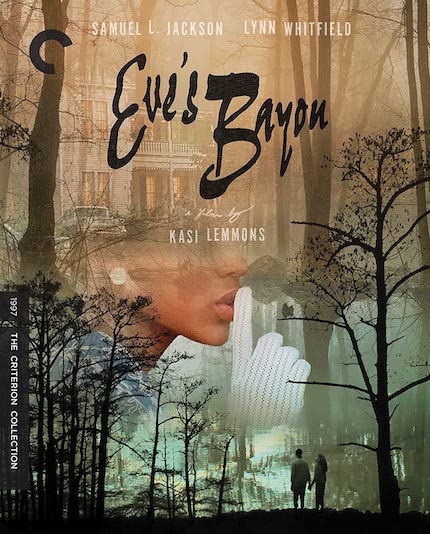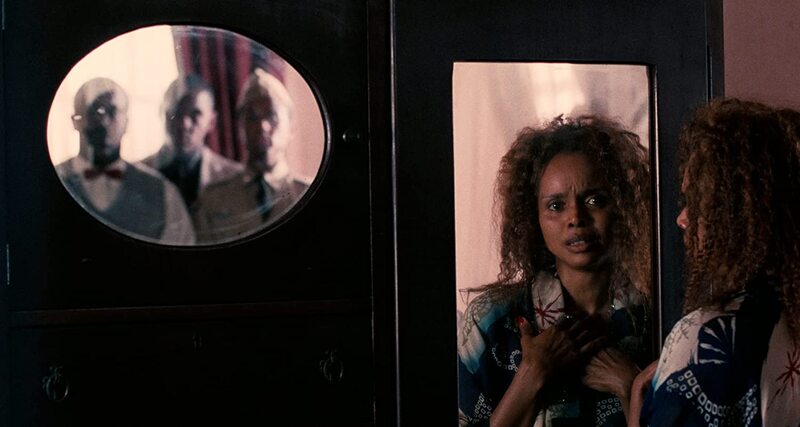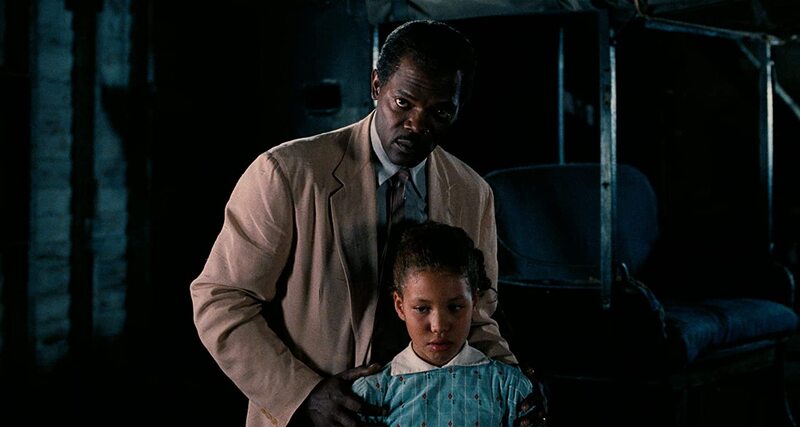Blu-ray Review: Criterion Ventures Into EVE'S BAYOU
Samuel L. Jackson and Jurnee Smollett star in Kasi Lemmons’ mysterious family drama, set in America’s Deep South.

Deep in the bayous of Louisiana, ghosts of the past swirl and conspire to perpetuate grievances of old wounds and maybe cultivate a few new ones. It’s 1962, and the tight knit and expansive Batiste family is suppressing a few specters of its own.
Solemn and serious from start to finish, Eve’s Bayou is an indelible if not exceptional debut film courtesy of actress turned first-time writer-director Kasi Lemmons (Harriet; Whitney Houston: I Wanna Dance with Somebody). As a filmmaker, she certainly set up challenges for herself with the material, what with the remote locations full of water, bugs and snakes, not to mention her central protagonist being a young kid. That means a young actor has to essentially carry this already unconventional Southern Gothic.
Little Jurnee Smollett (Lovecraft Country; Birds of Prey) does an admirable if, yes, imperfect job in said title role of Eve. Her precarious venture into the drama and trauma that grownups wreak begins when she wanders from a party being hosted in her house to happen upon her beloved father, the respected town doctor, committing adultery with a local dish in the greenhouse out back. Being too young to register exactly what she’s seen, Eve nevertheless understands that it was all kinds of wrong.
Eve’s father is played by Samuel L. Jackson, by then a major star but still game for the occasional adventurous indie. Jackson imbues the philandering Dr. Louis Batiste with a convincing blend of genuine fatherly love, husbandly affection, and ladies’ man caddishness.
The actor was no doubt a major get for this independent-level production at the time, though he too can’t be said to perfectly fill his role. It is his character, however, replete in his troubled Batiste family lineage, that propels the story.
The large all-Black cast of primarily less experienced big-screen talent includes Debbi Morgan, Lynn Whitfield, Lisa Nicole Carson, Meagan Good, Roger Guenveur Smith, Vondie Curtis-Hall, and musical great Branford Marsalis. Interestingly, the usually glamorous Diahann Carroll goes earthy and eerie, complete with ghostly plastery white makeup, in her supporting role as Elzora, the local mystic.
Lemmons does an admirable job of fleshing out a Black, naturalistic Southern world and its particulars, largely unexplored in cinema at that time. Even in the mid-1990’s moderately expanding field of studio-backed Black cinema, the expectations of releases slotting easily as either violent urban tragedies or contemporary women’s pictures were a given.
Eve’s Bayou, as a period family drama set in a remote, almost otherworldly locale, defies those narrow parameters. If anything, the stylistic flourishes of Lemmons at this point -- see: her impressionistic use of pure black and white threshold footage for particular flashbacks -- place her closer to the bold mid-‘90s work of Oliver Stone or Spike Lee, whose Clockers and Crooklyn also bucked various Black cinema trends of the time.
Though far from a bad film, or even a chronically flawed film, Eve’s Bayou suffers from tonal thickness. Lemmons’ directorial sensitivities are often pushed to the side by a continuous kind of archness. Rather than strategically doled-out melodrama, Eve’s Bayou maintains a challengingly consistent register that sometimes seems to exceed the grasp of the less experienced creatives involved.
Climactic moments do come, however. How well they satisfy, however, has everything to do with one’s tolerance for the persistent, mostly implied presence of heavy-laden twisted carnality that, like in so much of life, corrupts both individuals and community. Consequently, many will no doubt venture into the fog of debate as to whether Eve’s Bayou is truly worthy of the Criterion branding. To address that, it’s important to first consider the history of the label’s lofty perception.
In its own history, Criterion never outwardly went as far as to proclaim itself Keeper Of The Canon. But then again, it certainly never went out of its way to deny that widely held public perception.
The still-small New York company, founded in 1984, originated the “film school in a box” approach to releasing films into the burgeoning home video marketplace. In so doing, Criterion created the audio commentary and solidified a reputation for copious, high-end bonus material. The vast, vast majority of its prestigious efforts, it happens, was in the service of European white auteurs. While this approach went largely unquestioned for most of the label’s lifetime, all that changed during the widespread racial reckoning of 2020.
In August of that year, The New York Times publicly took Criterion to task for its lack of representation. A follow-up piece surmises the findings, as well as the company’s response: “Of more than 1,000 titles, only six were by African-American filmmakers, and none were by anyone born after 1957. Criterion’s president, Peter Becker, has been the company’s ultimate decision maker for years, and in an interview, he admitted to blind spots, adding, ‘The fact that things are missing, and specifically that Black voices are missing, is harmful, and that’s clear. We have to fix that.’”
Swiftly, film programmer and historian and author of the 2015 book Facing Blackness: Media and Minstrelsy in Spike Lee’s “Bamboozled,” Ashley Clark, was brought onboard as Criterion’s curatorial director. In the few short years that have followed, regular releases by women and non-white filmmakers have become a redefining norm.
The ramifications of this pronounced course correction have not only reinvigorated Criterion, they’re likely redefining it. Whether that leads to the “canonization” of such semi-recent, previously overlooked films of color as Devil in a Blue Dress or Eve’s Bayou, time will tell. In any case, for those of us who’ve been with the label for years and consider ourselves cinematic connoisseurs of its output, its own adopted challenges of redefinition also then must extend to us.
One thing immediately evident is that Criterion didn’t go light on the bonus features for Eve’s Bayou. The film is presented in both its 115-minute director’s cut (in a new 4K digital restoration supervised by director Lemmons and cinematographer Amy Vincent, with 5.1 surround DTS-HD Master Audio soundtrack), and, on a second Blu-ray disc, the original 108-minute theatrical-release version. Both play rightly ghostly, visually timed to maximize Vincent’s intended hard-won misty and mossy uncanny corners-of-the-mind aesthetic.
Criterion has conducted a new in-person video interview with Kasi Lemmons which runs over 30 minutes in length. Lemmons reflects on her own nomadic upbringing and how exposure to the different cultures around the U.S. fed her own creativity and fascination with storytelling. It’s an insightful piece, regardless of how well you received Eve’s Bayou.
She tells of when the opportunity came to parlay her acting success into a chance to direct her own first screenplay, she was told to create a stand-alone proof of concept short film set in the “Eve’s Bayouuniverse.” That film is called Dr. Hugo (1996), in a new 4K digital transfer, and it is available as a separate extra.
Though the extras on this edition are plentiful, several are recycled. Most prominent of these is the audio commentary, a group affair recorded in 2002 for a previous release of the Eve’s Bayou director’s cut. It’s a forthright and continuous track with Lemmons, cinematographer Amy Vincent, producer Caldecot Chubb, and editor Terilyn A. Shropshire, with much discussion of the differences and preferences between the two cuts of the film, as well as the massive learning curve in shooting the film, period. Much is shared of how, despite the film’s languid vibe, the production- and post-production- were anything but.
Much newer but also recycled is an hour-long cast reunion conducted in February 2021 via Zoom for the New Orleans Film Festival. Moderated by filmmaker Zandashé Brown, the sprawling conversation features Lemmons, actors Lynn Whitfield, Meagan Good, and Jurnee Smollett as well as composer Terence Blanchard.
Like most every exchange from that moment in time, the first ten minutes are all about how everyone is dealing with quarantine from COVID. After that, it settles into a well-moderated Zoom call about the importance of Eve’s Bayou in everyone’s career. Zoom fatigue, however, is very real these days. To find that this was the format of the reunion was disappointing, though at the time it was also the only option.
A top-tier inclusion is Lemmon’s short film Dr. Hugo, made as a proof of concept for Eve’s Bayou, in a new 4K digital transfer. Smartly, in terms of story, it was created to work as an addendum to the then-hopeful feature, depicting an amorous house call by the titular doc (here portrayed by Lemmons’ husband Vondie Curtis-Hall rather than Samuel L. Jackson). At a brisk nineteen minutes, Dr. Hugo takes more of its cues from baudy sex comedies than Southern gothic that informs Eve’s Bayou.
There’s an initial male-fantasy ridiculousness about it (particularly for a female-conceived project) as the handsome doctor strolls through town to the swooning and flirting delight of every woman he passes. Victoria Rowell plays Stevie, the randy patient who manages to reel him in, just as she does in the Dr. Hugo adjacent bit in Eve’s Bayou. A dark twist arrives, however, when her husband (Michael Beach) comes home complaining to the doctor of a “personal problem." Infidelity, it seems, is epidemic amongst the men of this town.
I hesitate to say that even as its ghosts of the past collide with tensions of its modern day, Eve’s Bayou often fell short of possessing my imagination, or worse, my attention. That’s not to say that it is an unsuccessful film or “unworthy” of its Criterion-izing.
For all it accomplished in its time and how it sidestepped so many ingrained norms in doing so, it is justified in its inclusion to the Collection. Imperfections do not and cannot negate cinematic vitality, particularly from a historical perspective and especially then from marginalized perspectives.
With this two-disc Blu-ray release, Eve’s Bayou continues to nudge at established perceptions and assumed hierarchical norms. It operating outside of time in such ways back when it debuted, and does so again now.
Criterion’s official, full list of features for its release of Eve’s Bayou:
• New 4K digital restoration of the director’s cut, supervised by director Kasi Lemmons and cinematographer Amy Vincent, with 5.1 surround DTS-HD Master Audio soundtrack
• Original 108-minute theatrical-release version
• Audio commentary on the director’s cut featuring Lemmons, Vincent, producer Caldecot Chubb, and editor Terilyn A. Shropshire
• Dr. Hugo (1996), a short film Lemmons made as a proof of concept for Eve’s Bayou, in a new 4K digital transfer
• New interview with Lemmons
• Cast reunion footage
• Interview with composer Terence Blanchard
• New program showcasing black-and-white Polaroids that Vincent took during production
• Cast and crew photographs by William Eggleston
• Trailer
• English subtitles for the deaf and hard of hearing
• PLUS: An essay by film scholar Kara Keeling
The film is now available on Blu-ray from The Criterion Collection.https://www.criterion.com/films/32658-eves-bayou
Eve's Bayou
Director(s)
- Kasi Lemmons
Writer(s)
- Kasi Lemmons
Cast
- Samuel L. Jackson
- Jurnee Smollett
- Meagan Good









